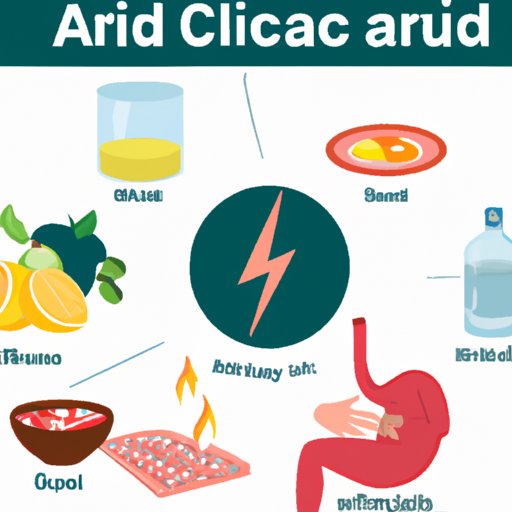
Introduction
Acid reflux occurs when stomach contents flow back into the esophagus, causing discomfort and sometimes even pain. It is a common condition, affecting millions of people worldwide. If left untreated, it can lead to more severe complications, such as ulcers and even cancer. The good news is that there are numerous treatments available to address acid reflux and manage its symptoms.
Understanding Acid Reflux
Acid reflux can be caused by various factors, including obesity, pregnancy, smoking, and certain medications. It happens when the lower esophageal sphincter (LES), the muscle between the stomach and esophagus, fails to close properly, allowing stomach acid to flow up into the esophagus. The symptoms of acid reflux can range from mild heartburn to more severe symptoms such as coughing, hoarseness, and chest pain.
There are six treatments for acid reflux: lifestyle changes, natural remedies, medications, surgery, alternative therapies, and combination therapy.
List of Natural Remedies for Acid Reflux
Natural remedies can be helpful in relieving symptoms of acid reflux. These include ginger root, slippery elm, chamomile, licorice root, aloe vera juice, and baking soda. These natural remedies are known for their ability to reduce inflammation and promote healing, aiding in the relief of acid reflux symptoms.
When using natural remedies, it is important to remember that they may take longer to work than traditional medications. Additionally, they may interact with other medications or have side effects of their own. Always speak with a healthcare provider before starting any new supplement or natural remedy regimen.
Dietary Changes for Acid Reflux Relief
Dietary changes can make a significant impact on acid reflux symptoms. These include avoiding trigger foods such as citrus fruits, tomatoes, spicy foods, and fried foods. Incorporating more whole foods like fruits, vegetables, and lean proteins can also make a positive impact on digestive health and reduce the risk of acid reflux.
In addition to avoiding trigger foods, it is important to maintain a healthy weight, as carrying excess weight can increase the likelihood of acid reflux. Eating smaller, more frequent meals and waiting a few hours after eating before lying down can also help alleviate acid reflux symptoms.
Medications for Acid Reflux
Medications are often used to treat acid reflux symptoms. These include antacids, H2 blockers, proton pump inhibitors (PPIs), prokinetics, and foam barriers. Each type of medication works differently to reduce or block stomach acid production.
While they can be effective in treating acid reflux symptoms, medications can also have side effects and should be taken only under the guidance of a healthcare provider. Additionally, long-term use of certain medications may increase the risk of other health problems, such as kidney disease and osteoporosis.
Dealing with Nighttime Acid Reflux
Nighttime acid reflux can disrupt sleep and make it difficult to get adequate rest. To manage nighttime symptoms, it is important to avoid eating within three hours of bedtime, elevate the head of the bed, and sleep on the left side.
Other techniques include taking a warm bath before bedtime, practicing relaxation techniques such as meditation or yoga, and avoiding alcohol and caffeine in the evening. Additionally, wearing loose-fitting clothing to bed can help alleviate pressure on the stomach, reducing the risk of acid reflux symptoms.
Foods to Avoid with Acid Reflux
There are certain foods that are known triggers for acid reflux symptoms. These include chocolate, coffee, alcohol, carbonated beverages, fatty foods, and spicy foods.
To avoid triggering symptoms, it is important to read food labels and menus carefully, and to ask questions when dining out. Finding healthy and satisfying substitutes for these foods can also help alleviate symptoms.
Conclusion
Acid reflux can be an uncomfortable and serious condition if left untreated. With the right treatment and lifestyle changes, it is possible to manage symptoms and improve overall digestive health. Whether using natural remedies, making dietary changes, or taking medications, it is important to work closely with a healthcare provider to find the right treatment plan for each individual’s needs.




